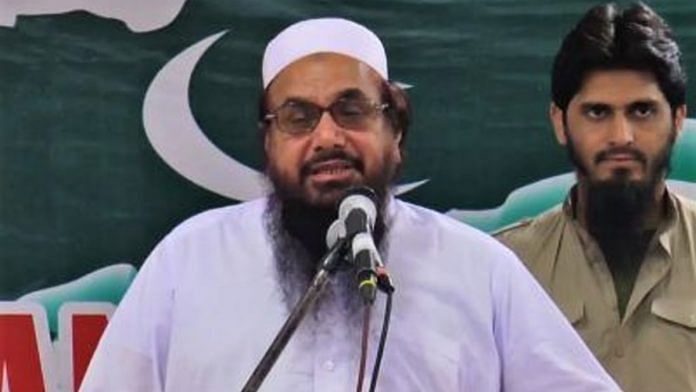New Delhi: Mumbai terror attacks mastermind Hafiz Saeed has been arrested by authorities in Pakistan, once again.
On Wednesday, the Jamaat-ud-Dawa (JuD) chief, who has a $10 million bounty on his head by US, was arrested near Gujranwala in Pakistan over terror financing charges.
The move came days ahead of Pakistan Prime Minister Imran Khan’s maiden visit to the US.
But if history is anything to go by, Saeed’s arrest may not be as permanent as US President Donald Trump would like to stress. “After a ten year search, the so-called “mastermind” of the Mumbai Terror attacks has been arrested in Pakistan. Great pressure has been exerted over the last two years to find him!” Trump tweeted Wednesday.
After a ten year search, the so-called “mastermind” of the Mumbai Terror attacks has been arrested in Pakistan. Great pressure has been exerted over the last two years to find him!
— Donald J. Trump (@realDonaldTrump) July 17, 2019
India hasn’t yet reacted to reports of Saeed’s arrest, one of the ‘most wanted‘ in the country. However, in the past it has expressed disappointment over Pakistan’s ‘arrest, free, repeat’ tactics to respond to international pressure.
Over the years, the JuD chief has been arrested multiple times only to go scot-free subsequently. ThePrint looks back at all such previous incidences of the arrest and release of this UN-designated terrorist.
2001
Close to seven years before the ghastly 26/11 attacks in Mumbai, Hafiz Saeed was detained for the first time on 21 December 2001, after the attack on Indian Parliament. Pakistan took Saeed into custody over pressure from India. The JuD chief was held until 31 March 2002, after which he was released, and arrested again on 15 May. This went on until 31 October 2002, when his wife Maimoona Saeed sued the Punjab provincial and Pakistan’s federal government on grounds of illegal detention.
2006
On 11 July 2006, a series of blasts ripped through Mumbai local trains, killing around 200 people. Saeed, founder of terror group Lashkar-e-Taiba, was blamed for this attack. India asked Pakistan President Pervez Musharraf for Saeed’s immediate arrest but it was rejected. However, on 9 August 2006, he was put under house arrest only to be released by the Lahore High Court a couple of weeks later. He was arrested again the same day but found his way out on 17 October.
2008
At least 170 people were killed in the 26 November 2008 terrorist attack in Mumbai. India considers Saeed as the mastermind of the four-day attack.
The United Nations placed a ban on Saeed’s JuD on 10 December 2008, calling it another Lashkar-e-Taiba front. A day later, Saeed was put under house arrest. But on 2 June 2009, a Pakistani court held that Saeed’s detention was unconstitutional and he was released despite strong protests from India and the US.
2009
In August 2009, Interpol issued a Red Corner Notice against Saeed over India’s repeated pleas for his extradition. Following the notice, he was again placed under house arrest in September. However, he was freed later by Lahore High Court which quashed all cases against Saeed. Moreover, the court also passed the order that Jamaat-ud-Dawa was not a banned organisation and can work freely in Pakistan.
2017
On 31 January 2017, Pakistani authorities placed Hafiz Saeed in ‘preventive detention’ for disturbing peace and security. Months later, the Lahore High Court freed the terror mastermind again on 24 November, saying there was “nothing tangible” in the evidence presented against him.
Also read: Hafiz Saeed’s financier owns 23-storey building in London, luxury flat in Delhi: NIA



